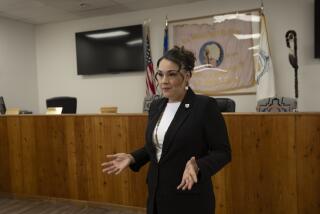Atheist may sue for right to perform weddings in Vegas
- Share via
LAS VEGAS — In a city launched by shotgun weddings and quickie divorces, and which offers the chance to be wed by faux Liberaces, King Tuts and Grim Reapers, there remains at least one nuptial taboo: You can’t be married by an atheist.
Michael Jacobson, a 64-year-old retiree who calls himself a lifelong atheist, tried this year to get a license to perform weddings. Clark County rejected his application because he had no ties to a congregation, as state law requires.
So Jacobson and attorneys from two national secular groups -- the American Humanist Assn. and the Center for Inquiry -- are trying to change things. If they can’t persuade the state Legislature to rework the law, they plan to sue.
Jacobson, who spends most afternoons reading online or dining at a nearby buffet, is an admittedly reluctant plaintiff. But he’s willing to fight on principle, recalling one time he couldn’t: In the 1960s, the Army demanded that his dog tags note his religion. He reluctantly chose Judaism, which reflected his ancestry if not his beliefs.
“One of the things I like to do is stand up and say I’m a nonbeliever, so you know you’re not alone,” he said recently.
For years Mel Lipman, a friend of Jacobson’s and president of the American Humanist Assn., had presided over nonreligious weddings in Las Vegas. But he belonged to the Humanist Society, a secular branch of the Humanist Assn., whose tax status as a religious group satisfied the clerk’s requirements.
When Lipman and his wife moved to Florida this spring, Jacobson -- a balding man with a thin, white mustache and a trace of his native Philadelphia in his voice -- decided to become the local atheist celebrant.
“But I’m not going to do it by saying I belong to a religious organization,” he said. “That’s a sham, because atheists are not religious.”
Jacobson filled out an application to perform marriages, but sidestepped the questions on religion. County Clerk Shirley Parraguirre said she had little choice but to reject it.
As Nevada law requires, all of the county’s 2,500 or so licensed officiants are connected to a congregation -- though some are as small as two people, Parraguirre said. (Judges and commissioners of civil marriages can also lead ceremonies.)
Some of the state’s regulations hark back to the 1960s, when ministers were dumping their flocks to become wealthy “Marrying Sams,” according to the book “Las Vegas: An Unconventional History.” One would-be officiant apparently hoped to marry enough people to finance his divorce.
Lawmakers, trying to ferret out the profit-hungry, said weddings must be among a minister’s “incidental” duties. Drive past the string of neon-lighted downtown chapels, and you’ll see that didn’t quite pan out.
Clark County issues nearly 100,000 marriage licenses a year and boasts dozens of places to exchange vows -- atop Harley-Davidsons, in Renaissance costumes, aboard gondolas -- 24 hours a day. The competition is so fierce that in recent years, employees at rival chapels have accused one another of slashing tires and shouting death threats. “Someone is working at all of these chapels,” said Parraguirre, whose office doesn’t have the resources to track down ministers flouting the law. In fact, she worries that if the criteria to become an officiant changes, her staff will be “bombarded with people coming in and just doing it for a job.”
But Bob Ritter, an attorney for the American Humanist Assn., argued that when a celebrant marries a couple, he is acting as an agent of the state. Therefore, it’s unconstitutional to block someone from holding that position based on his religion -- or lack of it, he says.
“Many atheists and agnostics have . . . deeply held beliefs,” Ritter wrote in a letter to Parraguirre. “Are not their beliefs entitled to the same respect?” Nevada law, he continued, implies that “the religious are more trustworthy than the nonreligious. This is a bigoted assumption.”
Most state laws regarding who can wed couples are akin to Nevada’s, Ritter said. At least three states, however, allow notaries -- who are licensed to administer oaths and act as witnesses -- to preside over “I do’s.” Ritter hopes Nevada legislators will embrace something similar.
If not, Ritter might have success in court, said Lynne Henderson, a law professor at the University of Nevada, Las Vegas. Judges performing ceremonies, for example, don’t have to meet religious criteria, so it’s absurd to make anyone else do so, she said. Officials could regulate celebrants in other ways, such as making them get training.
“It’s very weird,” Henderson said, “to try to support these laws in a city of 24-hour wedding chapels.”
--
More to Read
Sign up for Essential California
The most important California stories and recommendations in your inbox every morning.
You may occasionally receive promotional content from the Los Angeles Times.










